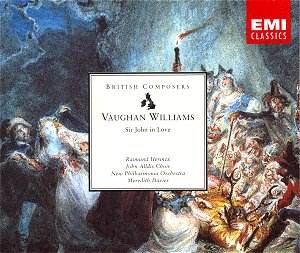This re-release from EMI Classics of the Vaughan
Williams comic opera Sir John in Love from 1975, makes
a most welcome return to the catalogues. I was listening to the
work for the first time and to be frank it exceeded all my expectations.
Perhaps I had fallen into the trap of subconsciously thinking,
‘if it’s not played often then it can’t be any good.’
The operas of Vaughan Williams are his least
known works although this is slowly being addressed on CD. These
rarely get a look-in compared to those of his contemporary Benjamin
Britten who had the tremendous advantage of having a purpose-built
opera house at Aldeburgh where his works would take priority.
Many influential judges consider Sir John
in Love a large improvement on its predecessor Hugh The
Drover. It has the clear advantage of a Shakespearean libretto
which Vaughan Williams so skilfully adapted. The opera is a most
romantic work with much expanded love music and ravishing harmonies.
I found the music richly melodic and entrancing too. At times
I wished that the layer of voices could be taken off to hear it
as a purely orchestral work.
Sir John in Love was the only stage work
to which Vaughan Williams gave the title opera. It was written
between 1924 and 1928. In terms of date of completion it is preceded
by The Shepherds of the Delectable Mountains and Hugh
the Drover (Love in the Stocks) then followed by the
operas The Poisoned Kiss (The Empress and the Necromancer),
Riders to the Sea and The Pilgrim’s Progress (which
incorporated the majority of The Shepherds of the Delectable
Mountains).
The libretto was based on Shakespeare’s comic
play ‘The Merry Wives of Windsor’ with interpolations from other
authors and other Shakespeare plays. Vaughan Williams originally
planned to call the opera The Fat Knight after the main
character Sir John Falstaff but as the work, both musically and
textually, began to take on a more romantic form he altered the
title to Sir John in Love. The work is sometimes said to
lack a deep undercurrent and is rarely performed professionally
largely owing to the high cast number of twenty soloists. This
is an impractical number for an opera, making production extremely
complicated, creating difficulties for casting and making the
whole affair much more costly than most operas. We should bear
in mind that it had to wait for fourteen years for its first professional
performance in 1946.
One critic, H.C. Colles, found the opera’s orchestral
score to be, harsh and ungrateful to the ear. Probably he had
only heard amateur performances of the work. This viewpoint certainly
contrasts with my opinion of the opera. I consider it to be of
high musical value and that is also the view of Vaughan Williams’
biographer, Michael Kennedy, who considers the work to be, most
mellifluous and sweet. He finds it inexplicable why this high-spirited
piece has failed to find a place in the repertory.
Beautiful and exciting music abounds throughout.
On tracks 1 and 19 on CD 2 there is music as elegiac as in any
slow movement from one of his symphonies. On CD 2 track 28 there
is a passage featuring the full orchestra complete with Wagnerian
horn calls; it just doesn’t get much more exciting than this.
Furthermore on CD 2 track 23 the orchestral passage known as Greensleeves
is heard. This is the best known and arguably the most beautiful
piece of English folk music ever written. Perhaps someone might
one day construct an arrangement of an orchestral score or even
a symphony from the opera; after all in 1931 Vaughan Williams
made the cantata In Windsor Forest from choral extracts
from the opera.
Vaughan Williams does not make any striking use
of the leitmotif. However various characters do have their own
musical themes, for example Anne Page is followed throughout with
beautiful melodies. The composer unashamedly included several
of his favourite folk songs in the score in addition to composing
an original ‘folk tune’ of his own.
The cast is strong with hardly a weak link in
the twenty soloists. Most notable is Raimund Herincx whose casting
as Sir John Falstaff was a master-stroke and is the cornerstone
of the recording. Clearly in his prime here, Herincx is most convincing
and displays an exceptionally clear and deeply ripe baritone.
As Anne Page soprano Wendy Eathorne seems to wobble at times but
sounds very fine when in full flow. Robert Tear, as Anne Pages’
lover Fenton, is a rich and expressive tenor whose distinctive
vibrato has never been problematic to my ears. I would also like
to single out the baritone of Colin Wheatley as The Host of the
Garter Inn and tenor Gerald English as Dr. Caius for particular
praise for their excellent performances.
Conductor Meredith Davies comes across as a sympathetic
advocate who seems to be revelling in the music; swift in pace
but in total control of the proceedings. The New Philharmonia
Orchestra evidently love the rare opportunity of performing this
music demonstrating some fine playing. The John Alldis Choir are
in fine voice too.
Recorded back in 1974 at the Abbey Road Studios
in London the sound is clear and well balanced. In my opinion
the performance sounds strangely dated - certainly all of its
29 years. Could the reason be that the style of singing from the
mezzo-soprano and contralto voices has changed over the years?
Furthermore the light tenor voice of Bernard Dickerson as Slender,
who reminds me of Peter Pears, also sounds as if from another
era.
EMI Classics have provided a superb booklet complete
with an informative essay from Michael Kennedy, a synopsis and
full libretto. The recording of this rich and colourful score,
so acclaimed since its original release back in 1975, still sounds
in fine condition. Combined with an excellent performance it is
well worth buying today.
Michael Cookson

